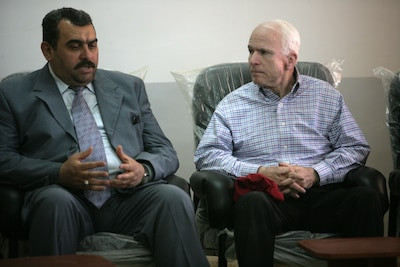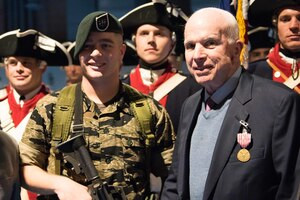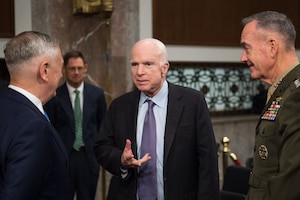WASHINGTON — The United States mourns the loss of Senator John S. McCain, a distinguished statesman and decorated war hero, who passed away yesterday in Arizona at the age of 81. His death marks the end of an era for American politics and military service, leaving behind a legacy of courage, dedication, and unwavering commitment to the nation. McCain, a retired Navy Captain, had been battling brain cancer, a fight he faced with the same tenacity and spirit that defined his entire life.
His passing has elicited heartfelt tributes from across the political spectrum and from military leaders, highlighting his profound impact on American society. Defense Secretary James N. Mattis issued a poignant statement acknowledging McCain’s lifelong dedication: “We have lost a man who steadfastly represented the best ideals of our country,” Mattis stated in a DoD release. “As a naval officer and defiant prisoner of war, John McCain stood with his brothers-in-arms until they returned home together.” Mattis emphasized McCain’s embodiment of national ideals, particularly his unwavering solidarity with his fellow service members.
McCain’s life story is deeply intertwined with the military. Born into a family with a strong naval tradition – both his father and grandfather were four-star Navy admirals – service was in his blood. Following in their footsteps, he graduated from the U.S. Naval Academy in 1958 and trained as a pilot. Driven by a sense of duty, he volunteered to serve in Vietnam, a decision that would profoundly shape his life and career.
In 1967, while on a bombing mission over North Vietnam, McCain’s plane was shot down. Severely injured during ejection, he was captured and endured over five years of brutal captivity as a prisoner of war in the infamous Hanoi Hilton. Despite immense suffering and torture aimed at forcing him to seek early release for propaganda purposes due to his father’s high-ranking military position, McCain resolutely refused to compromise his honor or leave his fellow prisoners behind. His resilience and defiance in the face of adversity became a symbol of American courage and unwavering commitment to comradeship.
A Legacy of Selfless Service
Secretary Mattis further underscored McCain’s dedication to public service, stating, “Passionately committed to our country, Senator McCain always put service to the nation before self.” This sentiment encapsulates McCain’s career, both in the military and in politics. He believed deeply in the importance of civic duty and action, a principle he articulated by saying, “a shared purpose does not claim our identity — on the contrary, it enlarges your sense of self.”
Marine Corps Gen. Joe Dunford, Chairman of the Joint Chiefs of Staff, also paid tribute to McCain’s lasting impact on the military community. In a written statement, Dunford noted, “Senator McCain exemplified what it means to be a warrior and dedicated public servant. Both as a naval officer and as a member of Congress, he was a lifelong and tireless advocate for the men and women of the U.S. military.” Dunford’s words emphasize McCain’s dual commitment to military service and public office, consistently championing the needs and well-being of service members throughout his career.
Upon his return from Vietnam, McCain faced a long and arduous recovery process, undergoing extensive physical therapy to regain his flight status. Demonstrating remarkable perseverance, he not only returned to flying but also commanded a training squadron in Florida. Later, he served as the Navy’s liaison to the U.S. Senate, bridging the gap between the military and legislative branches. He retired from the Navy as a Captain in 1981, leaving behind a decorated career that included the Silver Star, two Legions of Merit, the Distinguished Flying Cross, three Bronze Star medals, two Purple Hearts, and the Prisoner of War Medal. These accolades reflect his valor, leadership, and sacrifices throughout his military service.
McCain transitioned to a successful political career after retiring from the Navy. He was elected to the U.S. House of Representatives and subsequently to the U.S. Senate representing Arizona, where he became a prominent voice on national security and foreign policy. Joining the Senate Armed Services Committee in 1987, he became a powerful advocate for the military, consistently working to ensure that soldiers, sailors, airmen, Marines, and Coast Guardsmen received the resources and support they needed. His commitment extended beyond policy; he made it a point to personally connect with service members, listening to their concerns and visiting them on the front lines.
A Champion for the U.S. Armed Forces
General Dunford further highlighted McCain’s deep connection with the military community: “Senator McCain recognized the sacrifice and hardships military members and their families can experience and proudly served as their champion in Congress.” McCain’s advocacy extended to wounded warriors, whom he visited across the nation, offering encouragement and gratitude for their service. Dunford concluded, “Through his tenacious and selfless leadership in the Senate, he fought hard to ensure our armed forces remained strong and had the support and resources needed to succeed when placed in harm’s way.”
“While we mourn Senator McCain’s passing, we are eternally grateful for his distinguished service to our nation, his advocacy of the U.S. military and the incredible example he set for us all,” Dunford stated, encapsulating the widespread sense of loss and gratitude felt across the nation and particularly within the military community upon the passing of Senator John S. McCain. His legacy as a war hero, statesman, and champion of the armed forces will endure, inspiring generations to come.
(Follow Jim Garamone on Twitter: @GaramoneDoDNews)


 In a ceremony at Joint Base Myer-Henderson Hall, Virginia, on November 14, 2017, the U.S. Army paid tribute to Senator John S. McCain for his extraordinary 63 years of service to the United States and its military. The event highlighted McCain's enduring commitment and contributions to the nation's defense. Army photo by Pfc. Gabriel Silva
In a ceremony at Joint Base Myer-Henderson Hall, Virginia, on November 14, 2017, the U.S. Army paid tribute to Senator John S. McCain for his extraordinary 63 years of service to the United States and its military. The event highlighted McCain's enduring commitment and contributions to the nation's defense. Army photo by Pfc. Gabriel Silva  Senator John McCain is pictured greeting Secretary of Defense Jim Mattis and U.S. Marine Corps General Joseph F. Dunford, Jr., Chairman of the Joint Chiefs of Staff, prior to a Senate Armed Services Committee hearing on Capitol Hill on October 3, 2017. The hearing focused on the political and security landscape in Afghanistan, highlighting McCain's continued engagement with national security issues.
Senator John McCain is pictured greeting Secretary of Defense Jim Mattis and U.S. Marine Corps General Joseph F. Dunford, Jr., Chairman of the Joint Chiefs of Staff, prior to a Senate Armed Services Committee hearing on Capitol Hill on October 3, 2017. The hearing focused on the political and security landscape in Afghanistan, highlighting McCain's continued engagement with national security issues.